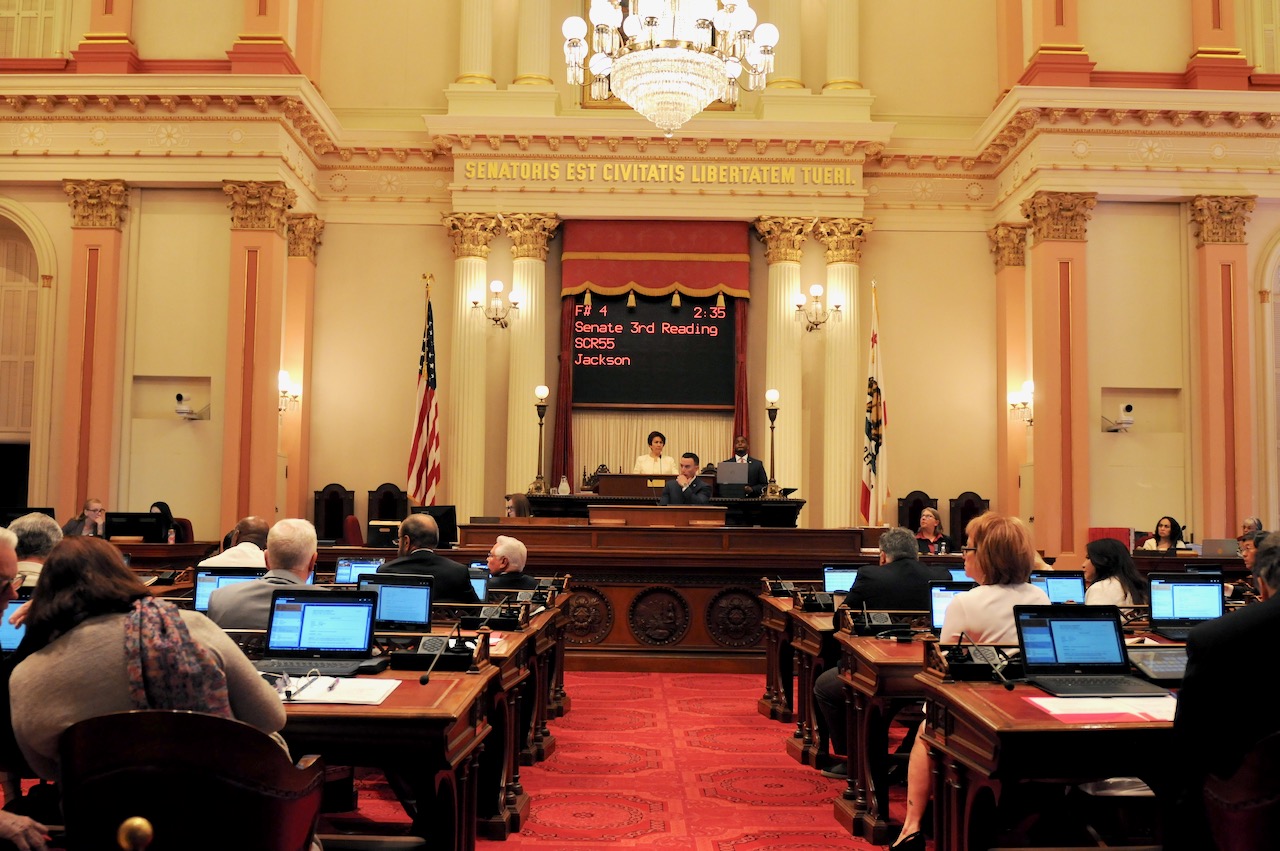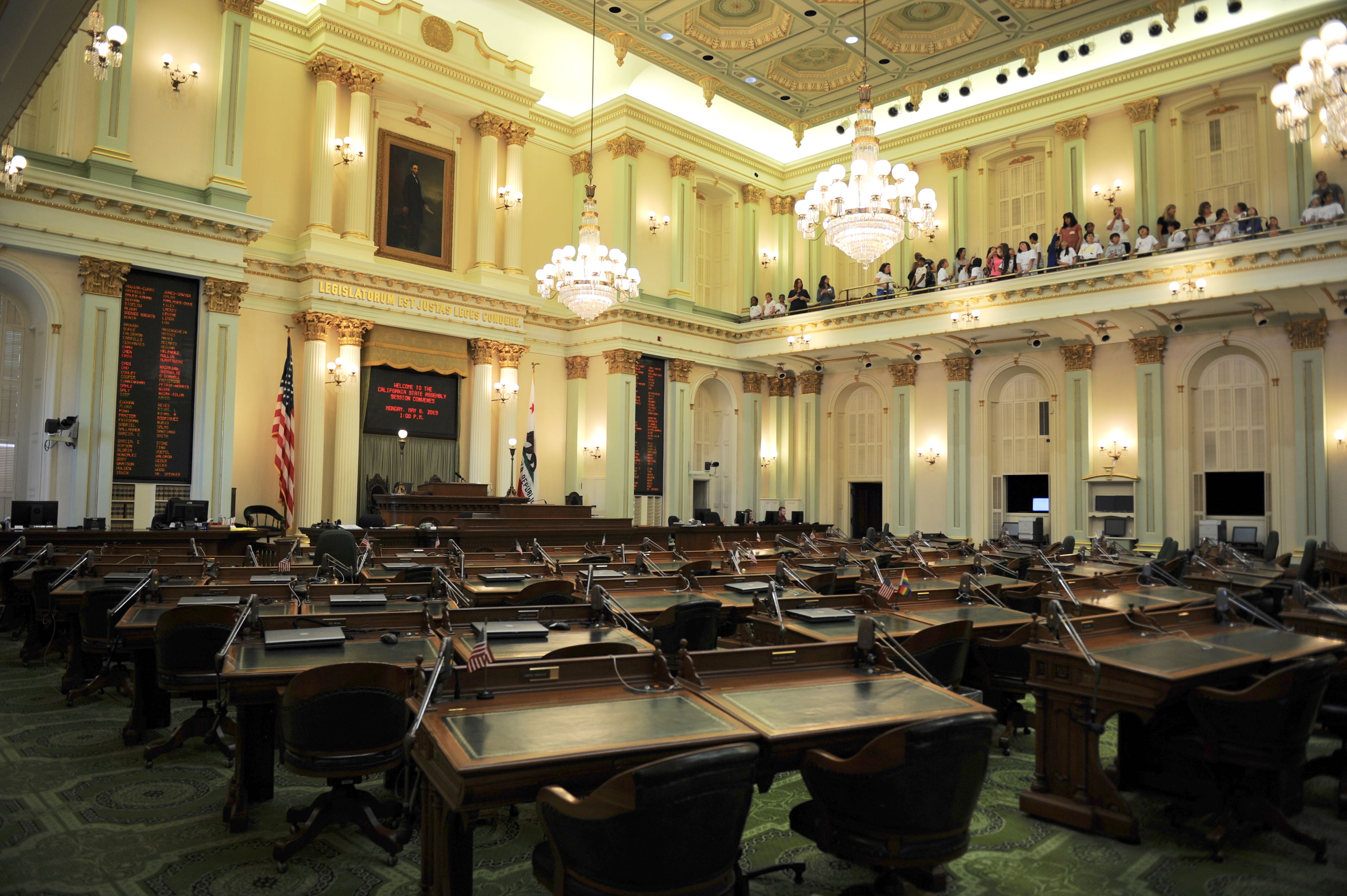
Judge's gavel on courtroom background. Law and justice. (Photo: Zolnierek, Shutterstock)
Numerous California Statutes Have Been Invalidated by the Courts
One state statute would have imposed tax on sales by out-of-state beef processors
By Chris Micheli, April 9, 2023 7:52 am
In reviewing whether California statutes are invalidated by the federal and state courts, I looked back at cases since the 1980s and put together a number of court rulings. Although this list is not exhaustive, it goes to show the large number of court decisions invalidating California statutes. Among the cases are:
State statute would have banned mandatory arbitration agreements in employment relationships (AB51) – Invalidated by 9th Circuit Court of Appeals.
State statute would have “discouraged” conveyances of federal land (SB 50) – Federal district court ruled it violates the U.S. Constitution.
State statute would have reduced damages the United States may recover for wildfires caused by the negligence of other parties. Health & Safety Code § 13009.2 – Declared unconstitutional by a federal district court.
State statute would have required charities and nonprofits operating in the state to provide the state attorney general’s office with the names and addresses of their largest donors – US Supreme Court struck down this statute in Americans for Prosperity Foundation v Bonta.
State statute would have prohibited the sale or rental of “violent” video games to minors. Civ. Code §§ 1746–1746.5 – US Supreme Court invalidated the statute in Brown v. Entertainment Merchants Assn as violating the First Amendment.
State statute would have required corporate board diversity for “underrepresented communities” (AB 979) – Los Angeles County Superior Court invalidated the statute in Crest v Padilla II.
State statute would have required a specified number of female members on corporate boards (SB 826) – Los Angeles County Superior Court invalidated the statute in Crest v Padilla I.
State statute would have allowed a private right of action against firearms manufacturers (SB 1327) – Federal district court invalidated the statute.
State statute would have limited what physicians can say about COVID-19 (AB 2098) – Federal district court invalidated the statute.
State statute would have amended the Political Reform Act to overturn a ban on public financing of campaigns. California Court of Appeal invalidated the statute as violating Prop 73.
State statute would have exempted surety companies from the scope of Prop 103. California Supreme Court invalidated the statute in its Amwest decision.
State statute would have allowed portable persistency discount amendment to Prop. 103 (SB 841). California Court of Appeal invalidated the statute as violating Prop. 103.
State statute would have amended Prop 36 – Garner decision invalidated the amendment as being inconsistent with the ballot measure approved by voters.
State statute would have required certain medically licensed pro-life centers that offer pregnancy-related services to notify clients that the state provides free or low-cost services, including abortion. Health & Safety Code § 123472 – U.S. Supreme Court struck down the statute in National Institute of Family & Life Advocates v. Becerra.
State statute would have amended California’s Determinate Sentencing Law allowing judges to sentence defendants to higher terms based on judicial findings of aggravating facts. Penal Code § 1170(b) – U.S. Supreme Court struck down the statute in Cunningham v. California.
State statute would have enacted the California Holocaust Victim Insurance Relief Act of 1999 requiring insurers doing business in the state to disclose insurance policies issued “to persons in Europe, which were in effect between 1920 and 1945.” Ins. Code §§ 13800-1380 – U.S. Supreme Court struck down the statute in AIA v. Garamendi.
State statute would have allowed prosecution of certain crimes after the previously applicable period of limitations for those crimes had expired. Penal Code § 803(g)(3)(A) – U.S. Supreme Court struck down the statute in Stogner v. California.
State statute would have modified California’s interest-deduction-offset provision of California corporate income tax laws. Rev. & Tax Code § 24344 – U.S. Supreme Court struck down the statute in Hunt-Wesson v. Franchise Tax Board.
State statute would have imposed a blanket format on political parties’ primary elections, allowing voters to vote for any candidate regardless of party affiliation. Elec. Code § 2001 – U.S. Supreme Court struck down the statute in CDP v. Jones.
State statute would have banned official governing bodies of political parties from endorsing candidates in primaries and imposed restrictions on the bodies’ internal governance procedures, organization, and composition. Elections Code §§ 11702, 29430 – U.S. Supreme Court struck down the statute in Eu v. SF County Democratic Central Cmte.
State statute would have modified the law governing the payment of child support that presumes a parent is financially capable of paying support, shifting to the defendant the burden of proving inability to comply with a payment order in a criminal contempt proceeding. Civ. Proc. Code § 1209.5 – U.S. Supreme Court struck down the statute in Hicks v. Dejock.
State statute would have required that preliminary hearings in a criminal case be open to the public unless exclusion of the public is necessary in order to protect the defendant’s right to a fair and impartial trial. Penal Code § 868 – U.S. Supreme Court struck down the statute in Press-Enterprise v. Superior Court.
State statute would have made persons who loiter or wander on the streets identify themselves and to account for their presence when requested by a peace officer. Penal Code Section 647(e) – U.S. Supreme Court struck down the statute in Kolender v. Lawson.
State statute would have imposed tax on sales by out-of-state beef processors. U.S. Supreme Court struck down the statute because it discriminates against interstate commerce in violation of the Commerce Clause. Deukmejian v. National Meat Ass’n, 469 U. S. 1100 (1985).
State statute would have required all wine producers and wholesalers to file fair trade contracts or price schedules with the state and to follow the price lists is a resale price maintenance scheme. U.S. Supreme Court struck down the statute as violating the Sherman Act in CA Retail Liquor Dealers Assn v. Midcal Aluminum.
State statute would have modified the community property statute to the extent it treated retired pay of Army officers as property divisible between spouses on divorce. U.S. Supreme Court struck down the statute on federal preemption grounds in McCarty v McCarty.
State statute would have imposed a prohibition on “due-on-sale” clauses in mortgage contracts. U.S. Supreme Court struck down the statute as preempted by Federal Home Loan Bank Board regulations permitting federal savings and loan associations to include such clauses in their contracts in Fidelity Federal S&L v. de la Cuesta.
State statute would have required under California’s franchise law the judicial resolution of certain claims. U.S. Supreme Court struck down the statute as being preempted by the Federal Arbitration Act in Southland Corp v. Keating.
State statute would have governed the operation of bingo games. U.S. Supreme Court struck down the statute as preempted as applied to Indian tribes conducting on-reservation games in California v. Cabazon Band of Mission Indians.
State statute would have provided, under California’s Labor Code, that actions for collection of wages may be maintained “without regard to the existence of any private agreement to arbitrate.” U.S. Supreme Court struck down the statute as preempted by the Federal Arbitration Act in Perry v. Thomas.
State statute would have dictated what slaughterhouses must do with pigs that cannot walk. U.S. Supreme Court struck down the statute as preempted by the Federal Meat Inspection Act (FMIA) expressly preempting state requirements that are in addition to, or different than, those made under the FMIA in National Meat Assn v. Harris.
State statute would have allowed certain sex offenders to obtain a certificate of rehabilitation and then request that they no longer have to register as a sex offender. Penal Code Sections 4852.01 and 290.5 – California appellate court determined sex offender law was unconstitutional.
State statute would have enacted a “Son of Sam” law. California Supreme Court determined the law violated the First Amendment.
State statute would have banned the sale of semiautomatic weapons to adults under 21 years of age. U.S. Court of Appeals ruled the statute was unconstitutional.
State statute would have banned the importation and sale of crocodile and alligator products in this state. U.S. District Court judge ruled the statute was federally preempted and invalid.
State statute would have modified groundwater charges. Water Code Section 75594. The district court ruled these charges unconstitutional the San Buenaventura case.
- Exemptions from Tax Withholding in California - July 23, 2024
- General Provisions of California’s Evidence Code - July 22, 2024
- Judicial Notice Under the California Evidence Code - July 21, 2024





Silly me, thinking the people elected/hired legislators to protect the rights OF the people, apparently their real passion is creating an abundance of laws restricting the people’s rights.
I’m curious about AB 2098, the bill meant to put a jackboot on speech of physicians (and I suspect all health care professionals) to toe the line with regard to Covid “consensus,” whatever that could possibly be at any given time. Failure to toe the line means risking the loss of their medical license. I’m sure this has the effect of chilling all earnest physician advice or care that doesn’t align with what govt determines it should be, which looks like a purposeful intent of the law.
The above article says “state statute would have limited what physicians can say about COVID-19 (AB 2098) – Federal district court invalidated the statute.”
Has AB 2098 been decided and scrapped?
I thought that in January there had been an injunction against AB 2098’s implementation until the matter is finally decided by the courts. This was covered here at The Globe but as far as I can tell was not much covered or publicized elsewhere, which is a problem all on its own. Meaning, as a practical matter, do most physicians even know that they can speak and act freely with their patients, at least for now? But I was unable to find anything elsewhere that said AB 2098 had been permanently invalidated or suspended.
There seems to be an attempt by govt and medical authorities to keep any such development under wraps. If no one knows about the injunction —- i.e., that AB 2098 is temporarily (or permanently?) suspended —- it amounts to the same condition that will continue to chill medical speech.
Seems to me patients should know exactly what’s what regarding the status of AB 2098. Meanwhile the burden is apparently on the patient to inform his or her physician about it. Guess we will see whether or not patients who inform their physicians will be taken seriously.
SO, in essence what this tells us is that California legislators propose laws that have no legal merit or standing and are WASTING OUR TIME AND MONEY proposing frivolous, unCONSTITUTIONAL laws???
So they truly ARE inept??? (But they ARE good at “virtue signaling” to their unions and “progressive” fundraising base, aren’t they???